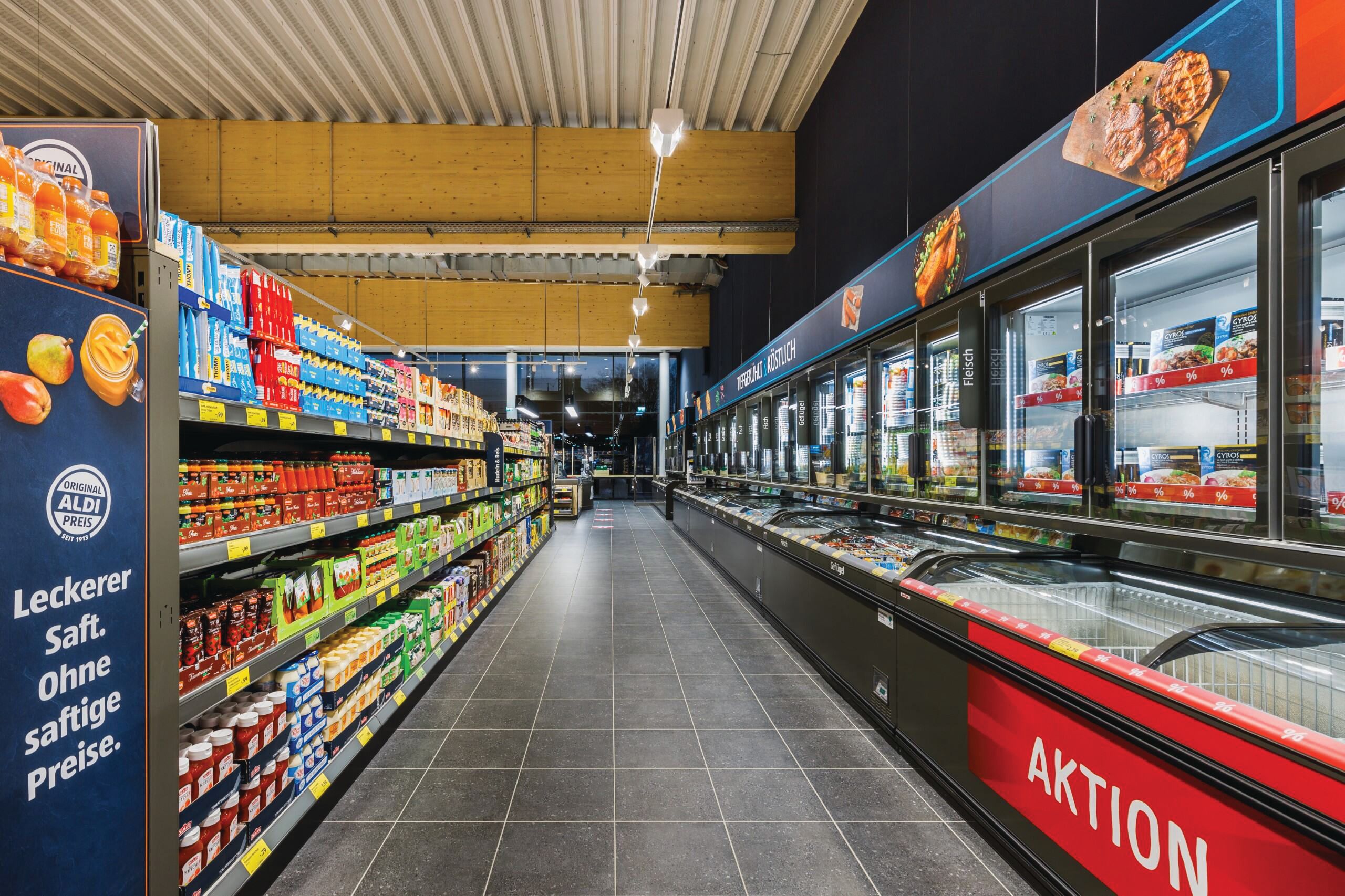Pillars Of The Global Community
The ALDI SOUTH Group is advancing sustainability efforts across 11 markets on four continents, with supply chains spanning more than 120 countries.
In this special report, ESM’s Stephen Wynne-Jones meets Anke Ehlers, MD, International Sustainability, ALDI SOUTH Group, to find out more.
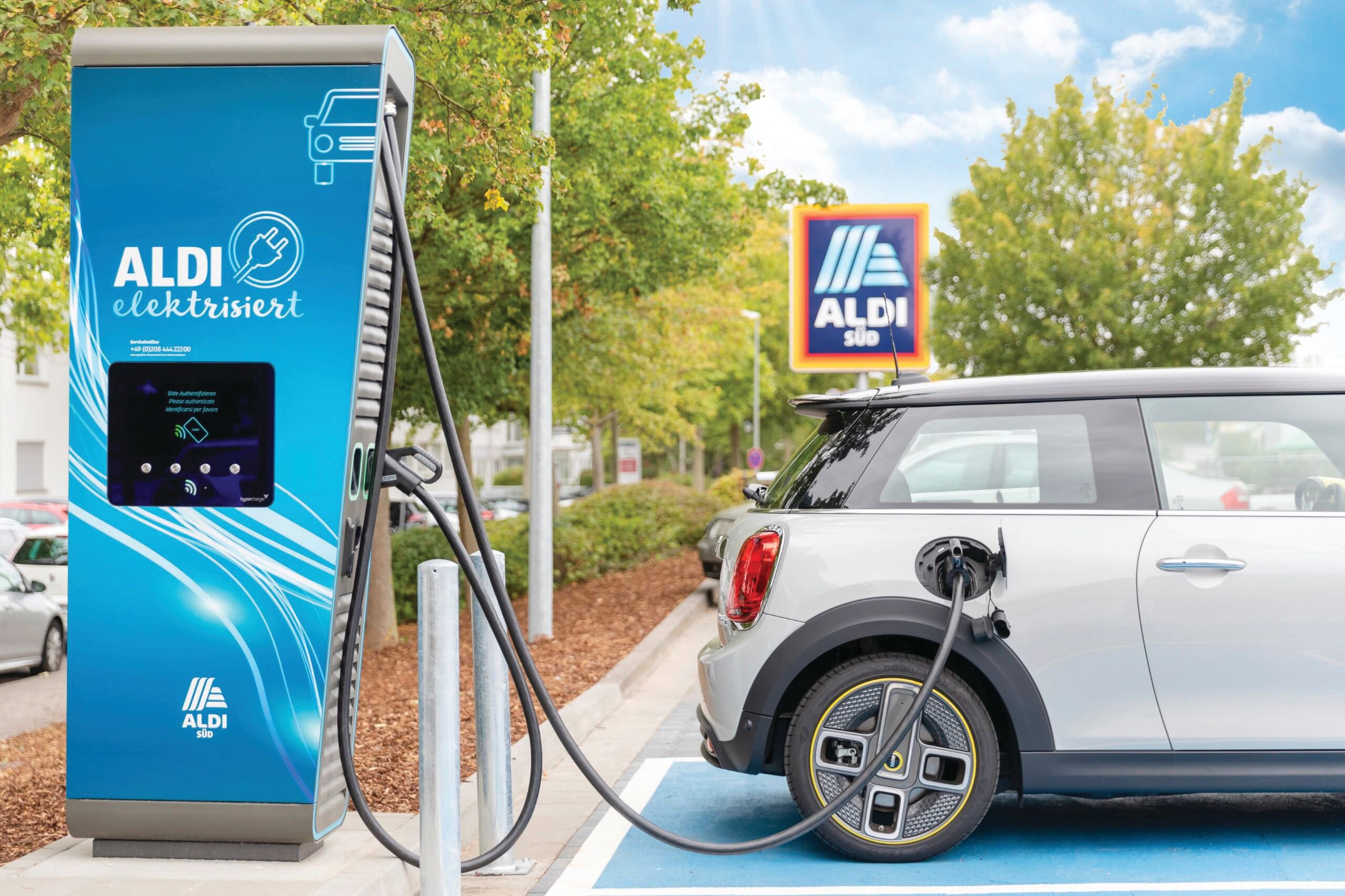
Sustainable Evolution
Tracing ALDI SOUTH Group's Progress in Sustainability
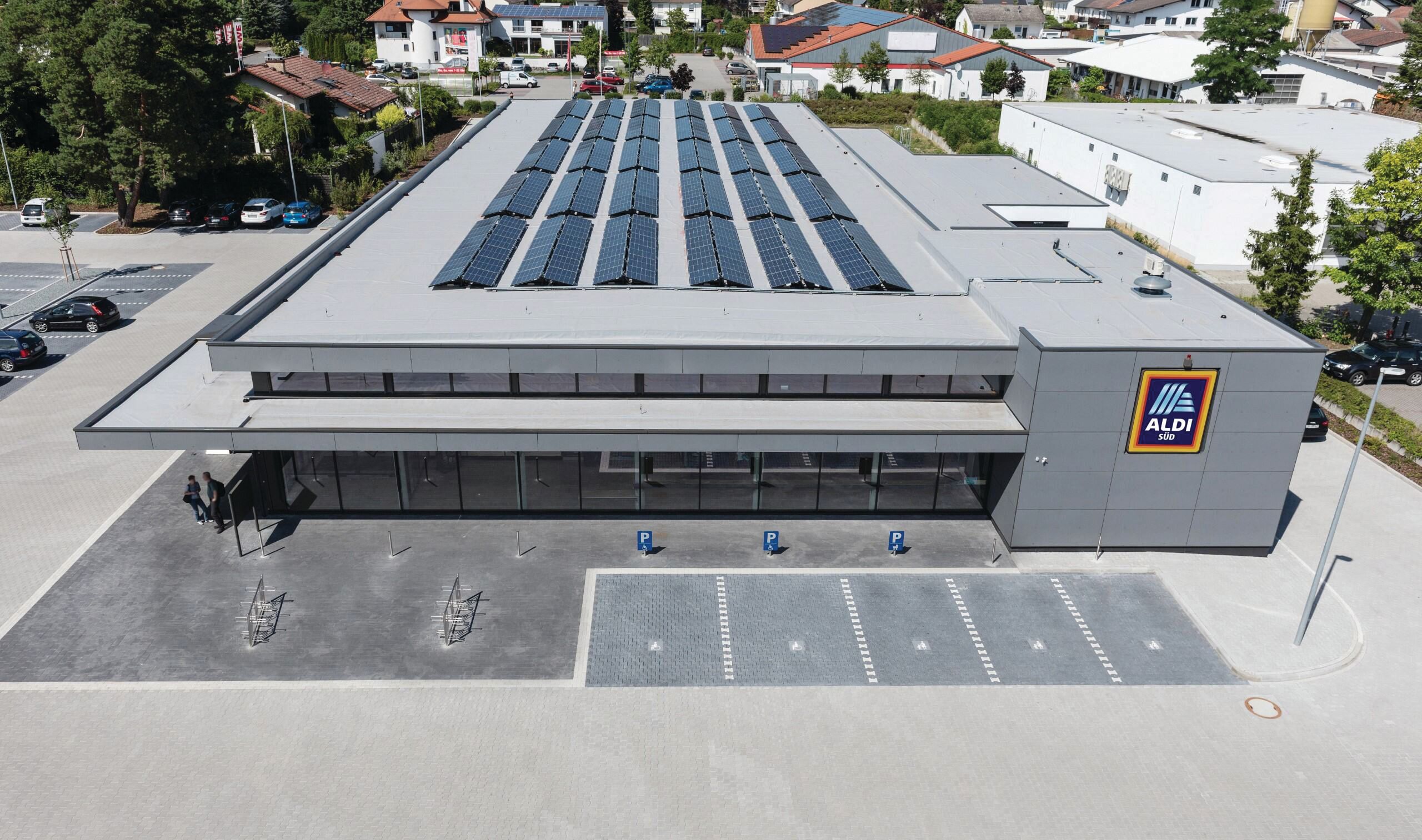
ESM: How has ALDI SOUTH Group’s approach to sustainability evolved over the past few years?
Anke Ehlers: When I began my journey in sustainability, nearly two decades ago, the primary focus for businesses was reputation management and compliance in very specific areas. Since then, it has evolved into a strategic initiative. Today, sustainability is crucial not only for mitigating long-term risks, but also for driving lasting business success and resilience.
Over the past 15 years, I’ve had the privilege of witnessing and contributing to ALDI SOUTH Group’s progress and its dedicated efforts to embed sustainability in all our 11 markets across four continents and within our supply chains, which span more than 120 countries.
“For current and future generations of customers, sustainability is, and will be, a crucial factor in their purchasing decisions. This drives the Group’s mission to make sustainability affordable for our customers, ensuring they have access to high-quality, value-for-money food without compromising their values.”
As a leading international retailer, we face significant challenges, driven by a range of overlapping factors. These include disruptions in global supply chains, rising energy and food costs, geopolitical conflicts, climate change, biodiversity loss, and the lingering effects of pandemics. As a result, we recognise the role we must play, and our aim is to place sustainability at the heart of all our decision-making, to maximise our societal impact.
It is an exciting and fascinating journey, but now we can proudly say that sustainability is a pillar of our customer value proposition, next to price and quality. Our goal is to provide high-quality, low-cost products to our customers while maintaining strict control over our operating costs and prioritising sustainability in our practices.
For current and future generations of customers, sustainability is, and will be, a crucial factor in their purchasing decisions. This drives the Group’s mission to make sustainability affordable for our customers, ensuring they have access to high-quality, value-for-money food without compromising their values. This mission is even more important during cost-of-living crises, when economic pressures are acute.
© ALDI SOUTH Group
© ALDI SOUTH Group
Strategic Achievements and Challenges
Key Milestones and Long-term Goals in Sustainability
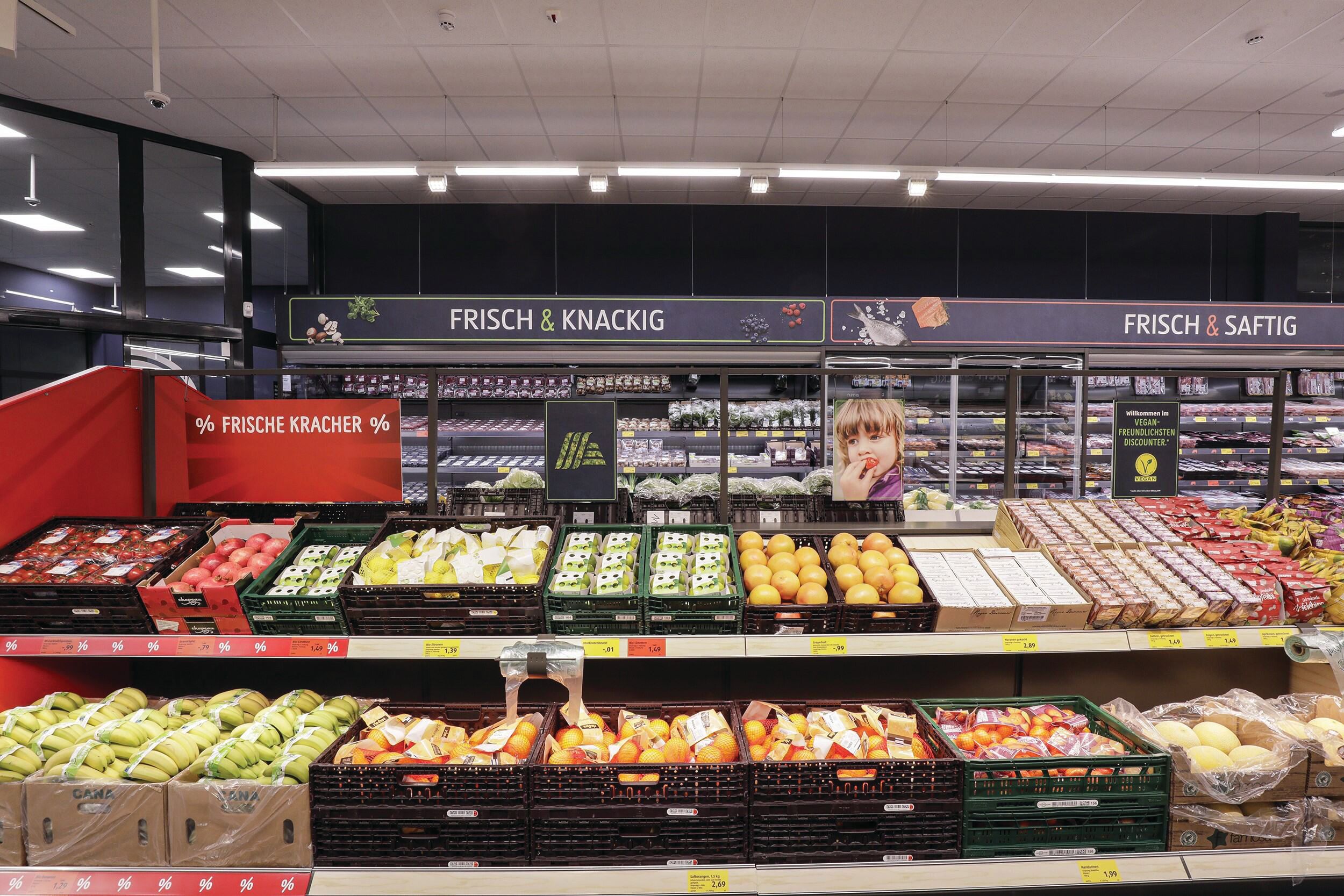
© ALDI SOUTH Group
© ALDI SOUTH Group
© ALDI SOUTH Group
© ALDI SOUTH Group
ESM: What have been some ‘quick wins’, and what has taken longer to implement?
AE: I wouldn’t describe any of our achievements as ‘quick wins’. Every target we’ve reached has been the result of exceptional teamwork and collective dedication. The most impactful milestone is the development of our Global Sustainability Strategy as one cornerstone of ALDI SOUTH Group’s Global Business Strategy, which positions sustainability as a core focus of our company.
Our efforts centre on six critical areas: Human Rights, Climate and Agriculture, Animal Welfare, Healthy Nutrition, Circularity and Sustainable Packaging, and Food Waste. For each of these domains, we have identified not only significant challenges, but also strategic business opportunities.
One of our top-priority areas is climate protection. Back in 2020, we set our first science-based emissions reduction targets. These goals covered Scope 1 and 2 emissions, which refers to the emissions generated from one’s own operations, including our stores, offices, distribution centres and transport fleet, as well as indirect emissions from purchased electricity for our assets. Our time frame for achieving these targets was to 2025, yet we achieved our goals in just two years.
We built on this achievement by, in 2024, becoming one of the first global grocery retailers to have science-based net-zero-by-2050 targets validated by the Science Based Targets initiative. This significant milestone paves the way for us to achieve net-zero carbon emissions not just in our stores and operations, but across our entire supply chains.
We have already made significant process on reducing emissions from our stores, particularly in refrigeration, cooling and heating, and we have also invested heavily in renewable energy sources, such as solar power and wind farms. We are also increasing our efforts to reduce supply chain emissions by partnering with suppliers to enhance the sustainability of on-farm practices and exploring decarbonisation opportunities in our upstream transportation.
Strong, collaborative relationships – whether within the business, with our buying or supply chain management teams, or with external partners along the value chain – are also at the heart of our efforts to respect human rights in our supply chains. This approach led to the creation of our new purchasing model in the fresh-produce sector, for example. Transparency and openness in operations, constant communication, as well as fostering good relations with key growers, are crucial factors in order to ensure that the prices we pay to our suppliers are fair and more accurately reflect sustainable production costs. This means that we are directly benefitting producers and workers. This is in line with our commitment to respecting human rights while improving living and working conditions throughout all our supply chains. Initially focused on bananas, this initiative has since expanded its scope to encompass other products, such as pineapples, and now avocados.
I could highlight additional key milestones, like ALDI’s participation in the Bangladesh and Pakistan Accord to uphold health and safety standards in the textile and garment industry, but these are just a fraction of our overall achievements. For a broader look at our efforts, our global sustainability website serves as a comprehensive resource and a vital point of engagement with consumers and stakeholders.
Driving Change Through Private Label
Aligning Product Offerings with Consumer Sustainability Preferences

ESM: What roles do ALDI’s private-label brands play in promoting organic and plant-based products, and how do they align with current consumer preferences for sustainability?
Millennials and youngsters, actual and future customers, expect the products they buy to have been sourced responsibly and to be sustainable, including the packaging. This preference applies not only to products tailored for individual markets, but also extends to our globally distributed product lines. Additionally, dietary preferences have shifted significantly. We’re seeing growing demand for vegan, vegetarian, and gluten-free options, as well as other selections that were less prominent in the past. We need to meet these evolving expectations while maintaining high standards.
© ALDI SOUTH Group
© ALDI SOUTH Group
Our own private labels make up 90% of our product range, and they are a huge lever to drive sustainability. These products allow us not only to define our specific high-quality standards and intercept our consumers’ needs as much as possible, but they also give us more influence over the supply chain, in terms of sustainability-related requirements from the very beginning. For example, our organic brands – Nur Nur Natur in Germany and Zurück zum Ursprung in Austria – play an important role in this scenario, harmonising, at the same time, quality, sustainability and affordability.
Compliance and Ethics in the Supply Chain
Ensuring Standards Meet Global Expectations
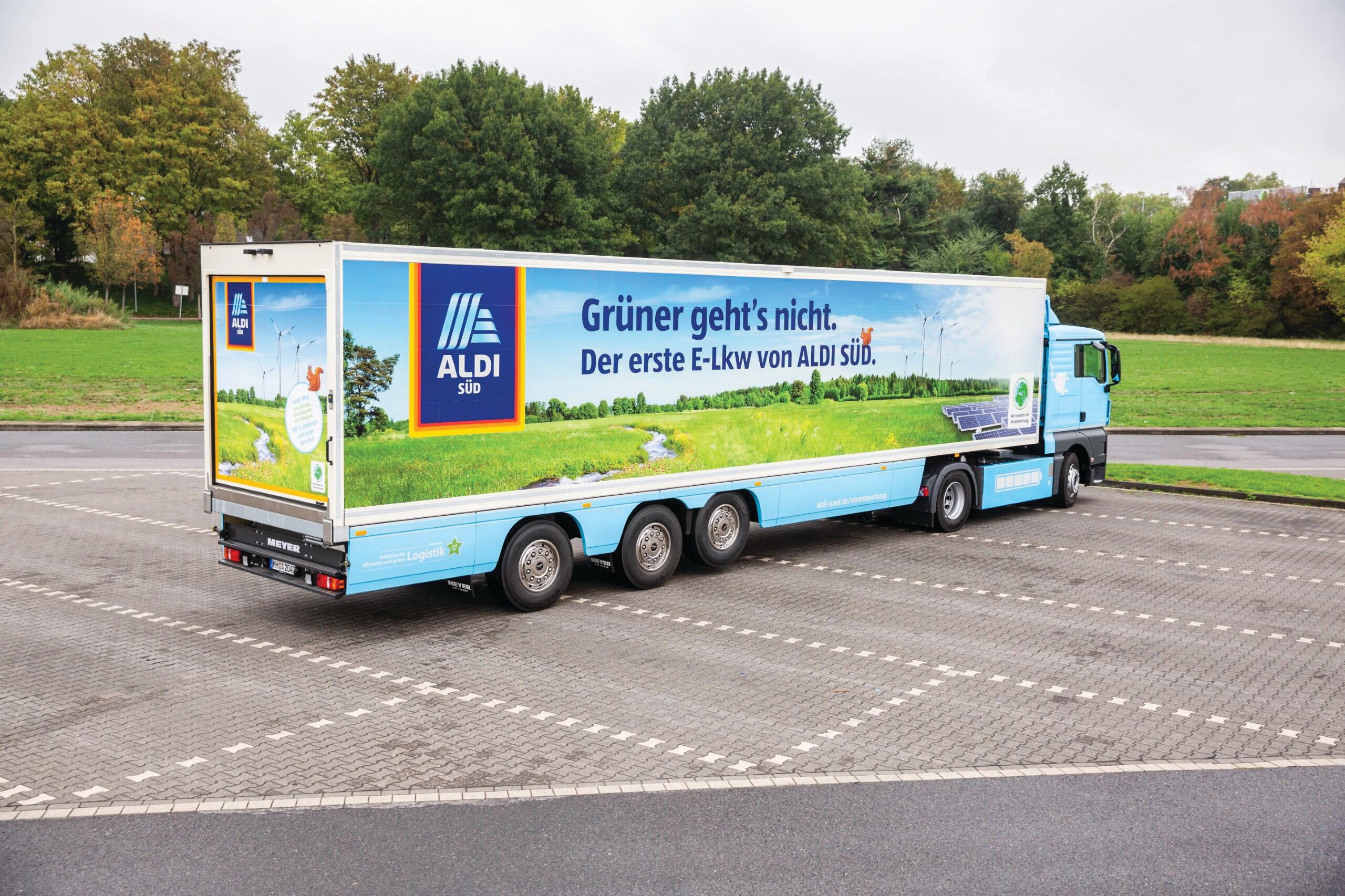
ESM: What specific steps is ALDI taking to ensure that its supply chain meets rigorous standards when it comes to sustainability and ethics?
AE: We work diligently to ensure compliance – not only with our standards, but also with current and emerging legislation. Global legislation, such as the EU Deforestation Regulation, the EU Corporate Sustainability Due Diligence Directive and the Corporate Sustainability Reporting Directive, along with many others, are reshaping the landscape. While adapting to these new laws can be challenging, we view them as an opportunity for driving positive systematic change and creating a true level playing field for businesses across multiple industries.
Our due-diligence framework helps us monitor human rights and environmental risks in our supply chains, to comply with legislation and uphold our commitments to human rights. The ALDI Business Partner Sustainability Standards outline our minimum requirements for our business partners. They cover such topics as non-tolerance for forced labour, child labour and discrimination, as well as requirements around environmental stewardship, freedom of association, and occupational health and safety.
In addition, we are actively preparing for the implementation of new regulations by strengthening our collaboration with other functions across the business, including risk and compliance, buying, property, as well as national sustainability teams across the ALDI SOUTH Group.
© ALDI SOUTH Group
© ALDI SOUTH Group
© ALDI SOUTH Group
© ALDI SOUTH Group
Our work focuses on continuous improvement in purchasing practices to mitigate adverse impacts on human rights and the environment. This includes aligning audit and certification requirements for supply chains based on identified risks and traceability. We provide training and e-learning for our employees and business partners, to strengthen the general understanding for key salient risks.
Beyond conducting sustainability assessments with our own monitoring units on the ground and human rights impact assessments, we organise regular field visits to the origins of our products. These trips often involve multiple stakeholders, including our international sustainability and global buying teams, along with non-profit organisations, enabling us to gain a comprehensive understanding of conditions on the ground.
These engagements allow us to identify the real needs of producers and pursue innovative, practical solutions. From cocoa in Côte d’Ivoire to textiles in Pakistan, from bananas in Colombia to nuts in Brazil, we are continually exploring creative strategies to support value chain optimisation.
Personal and Professional Insights
Advice for Enhancing Your Sustainability Impact

ESM: What advice would you give to those eager to improve their sustainability footprint, but unsure of where to begin?
AE: My advice to sustainability professionals is to steer clear of isolated operations and cultivate a culture of collaboration. Remember: sustainability encompasses your entire value chain. While many understand the true meaning of sustainability, not everyone, including decision-makers, have linked it to their specific role. It’s our job as experts to guide them on this journey, demonstrating why this is a strategic opportunity for business that will benefit all.
© ALDI SOUTH Group
© ALDI SOUTH Group
© ALDI SOUTH Group
© ALDI SOUTH Group
A common pitfall is viewing sustainability as the sole responsibility of sustainability teams. In reality, it’s a shared goal across the entire business, and everyone plays a crucial role in achieving this mission. The main challenge lies in helping each team member understand the specific part they have to play. This requires translating sustainability strategies into clear, actionable targets, creating accountability across the organisation, maintaining close stakeholder engagement, and providing continuous training, to stay aligned with sustainability requirements and the latest innovations and best practices.
Engaging external stakeholders is equally important. Working closely in partnership with suppliers and in multi-stakeholder initiatives are vital drivers of positive change. Our responsible-sourcing method for fresh produce, which I mentioned earlier, is just one of our successful collaborative projects to date.
Future Orientations
Next Steps in ESG for ALDI

ESM: What’s next on the agenda for ALDI, from an environmental, social and governance [ESG] standpoint?
AE: From an ESG standpoint, accurate and transparent data in reporting is vital – to measure where we are on our sustainability journey, to guide our decision-making, and to be compliant. I would go as far as saying that data is the currency of compliance.
Over the upcoming months, we are excited to continue our efforts towards the harmonisation and integration of IT tools and processes that will enable sustainability to be increasingly embedded into our business. Our goal is to manage all our key processes, such as supply chain and product traceability, risk management, climate impact, legislative disclosure, and data management, in a more digital, fast, friendly and efficient way. The new solutions will allow us to use innovative digital platforms for data collection and real-time identification of best practices across our markets, and this will be a key enabler to deliver on our sustainability strategies.
Learn more: https://sustainability.aldisouthgroup.com/en


